How does the Bible define hypocrisy? How can we avoid living lives of hypocrisy?
A Definition of Hypocrisy
The Greek word for hypocrisy used in the New Testament is “hypokrisis” and means “the acting on a stage” and it is from the use of having more than one face that the same actor portrayed. In other words, they are actors in the Greek theatres who would usually play more than one role. They would go off stage and pick up and use a different mask for each character and sometimes wouldn’t even leave the stage as they sometimes carried two faces or masks (from which we get “two faced”). Sometimes they played more than once character and so these actors were portraying someone other than their real self and thus they were being hypocrites; acting on a stage and pretending to be someone who they really weren’t. This is exactly what most of the religious rulers in Jesus’ day did. Essentially they had a way of acting in a way that goes against their claimed beliefs or feelings and pretending to have virtues and principles which they really did not have.
The Hypocrisy of the Scribes and Pharisees
No one had harsher words when speaking about, and often, speaking directly to the Pharisees and the scribes than Jesus did and for very good reason. Jesus said they “sit on Moses’ seat, so do and observe whatever they tell you, but not the works they do. For they preach, but do not practice” (Matt 23:2b-3). Even worse, “They tie up heavy burdens, hard to bear, and lay them on people’s shoulders, but they themselves are not willing to move them with their finger” (Matt 23:4) and “They do all their deeds to be seen by others. For they make their phylacteries broad and their fringes long, and they love the place of honor at feasts and the best seats in the synagogues and greetings in the marketplaces and being called rabbi by others” (Matt 23:5-7). In other words, they say one thing but do another. The love to be seen as “righteous” but are living a lie, living lives of duplicity, and are nothing more that play actors on a stage, only wanting to be seen as something that they really weren’t.
Jesus’ Rebuke of the Self-Righteous
Jesus openly chastised these men and said “woe to you scribes and Pharisees, hypocrites! For you shut the kingdom of heaven in people’s faces. For you neither enter yourselves nor allow those who would enter to go in. Woe to you, scribes and Pharisees, hypocrites! For you travel across sea and land to make a single proselyte, and when he becomes a proselyte, you make him twice as much a child of hell as yourselves” (Matt 23:13-15). They were making converts and making them even worse hypocrites than they were, if that were possible. He called them “blind men” (Matt 23:19) and “hypocrites! For you tithe mint and dill and cumin, and have neglected the weightier matters of the law: justice and mercy and faithfulness. These you ought to have done, without neglecting the others. You blind guides, straining out a gnat and swallowing a camel” (Matt 23:23-24)!! Jesus was saying that they went to the nth degree to obey the law but the most important parts of the law of God like justice and mercy they neglected. They were essentially blind guides leading the blind.
White-Washed Tombs
During the feasts, many of the graves of the patrons of the past had their graves cleaned up and their tombs whitewashed, which was only temporary and it was only a cover up for what was inside. This was why Jesus kept pronouncing woe after woe upon them as He said “Woe to you, scribes and Pharisees, hypocrites! For you clean the outside of the cup and the plate, but inside they are full of greed and self-indulgence. You blind Pharisee! First clean the inside of the cup and the plate, that the outside also may be clean” (Matt 23:25-26). Like the outside of the tombs, they cleaned up and whitewashed the outside but inside those graves they were full of all kinds of evil, filth, and dead men’s bones. They looked good to those who saw them from the outside but Jesus, knowing their hearts, knew that they were as evil as could be on the inside and their hearts were as vile as could be. This is exactly what He meant by saying “For you are like whitewashed tombs, which outwardly appear beautiful, but within are full of dead people’s bones and all uncleanness. So you also outwardly appear righteous to others, but within you are full of hypocrisy and lawlessness.” (Matt 23:27-28).
Murderers of the Prophets
Jesus saw right through their hypocrisy and said “you build the tombs of the prophets and decorate the monuments of the righteous” and then lie by saying “If we had lived in the days of our fathers, we would not have taken part with them in shedding the blood of the prophets” (Matt 23:29-30). Instead of pretending to honor the prophets, Jesus said “you are sons of those who murdered the prophets” (Matt 23:31) and actually fill up “the measure of your fathers. You serpents, you brood of vipers, how are you to escape being sentenced to hell? Therefore I send you prophets and wise men and scribes, some of whom you will kill and crucify, and some you will flog in your synagogues and persecute from town to town, so that on you may come all the righteous blood shed on earth, from the blood of righteous Abel to the blood of Zechariah the son of Barachiah, whom you murdered between the sanctuary and the altar” (Matt 23:32-35). Jesus predicts His own death by saying “some of whom you will kill and crucify” which they did Jesus within about a week and they would later do the same to nearly all the rest of the apostles.
Conclusion
No wonder Jesus laments over Jerusalem “the city that kills the prophets and stones those who are sent to it” (Matt 23:37) and you could include Jeremiah, Ezekiel, and many others from the Old Testament as well as Jesus and several of the apostles in the future. Their lives of hypocrisy made Jesus very angry but it was a righteous indignation since God resists every proud heart and will only extend grace to those who humble themselves before Him (James 4:6).
Article by Jack Wellman
Jack Wellman is Pastor of the Mulvane Brethren church in Mulvane Kansas. Jack is also the Senior Writer at What Christians Want To Know whose mission is to equip, encourage, and energize Christians and to address questions about the believer’s daily walk with God and the Bible. You can follow Jack on Google Plus or check out his book Blind Chance or Intelligent Design available on Amazon.
















